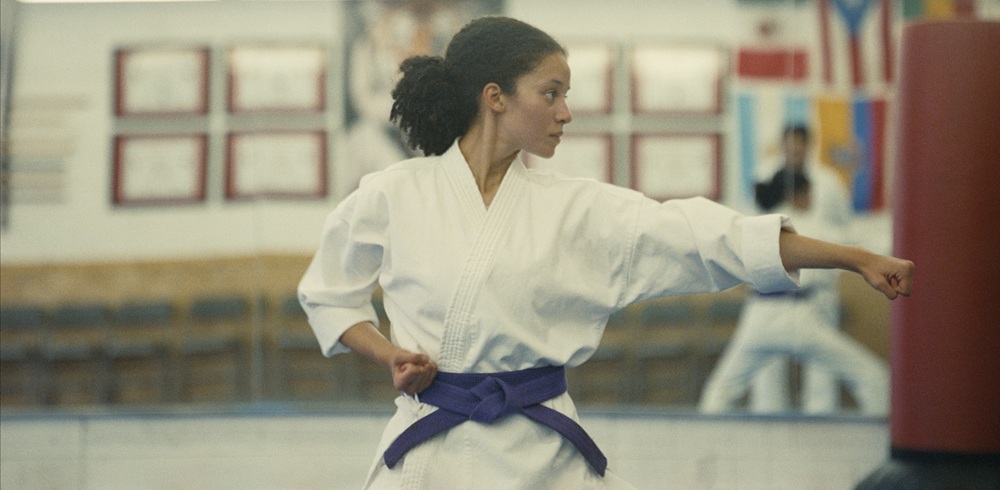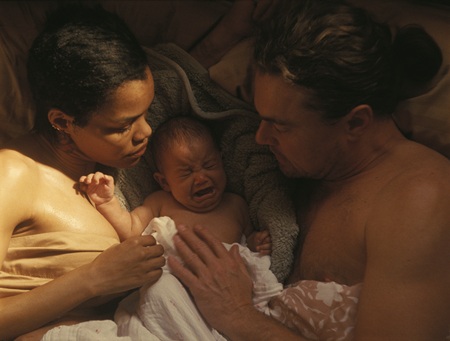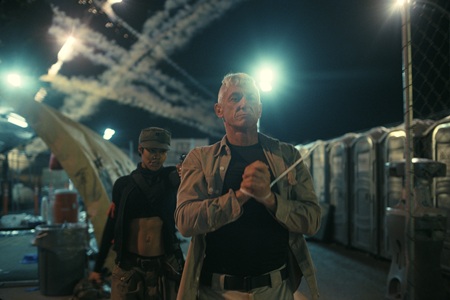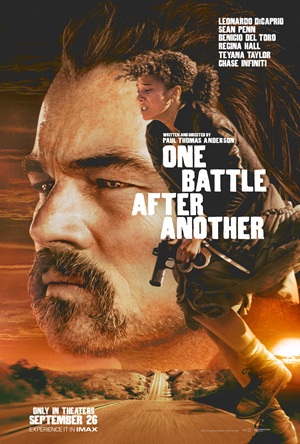
One Battle After Another (2025)
by Sara Michelle Fetters - September 26th, 2025 - Four-Star Corner Movie Reviews
One Battle After Another is a Spellbinding Joyride into the Unknowable Here and Now
Paul Thomas Anderson never keeps things simple. For his revolutionary epic One Battle After Another, the mind behind such idiosyncratic masterworks as Magnolia, Punch-Drunk Love, There Will Be Blood, The Master, and Phantom Thread confidently pulls out all the stops. A character study full of action, comedy, familial strife, and social and political commentary, the film is a magical tapestry of an America stalled at the center of a perilous crossroads. This is one of 2025’s best films.
The opening section is set during the early 2000s and follows a cadre of revolutionaries unironically calling themselves “The French 75.” While the group doesn’t have a leader, it is still clear that every member thinks highly of Perfidia Beverly Hills (Teyana Taylor). This includes her cuckolded, bomb-making impresario husband Pat (Leonardo DiCaprio). But after the birth of their daughter, he starts second-guessing what it is they’re all doing, panicking over what might happen to their child if things for the French 75 fall into disarray.
These worries become a reality after a brazen bank robbery goes sideways and Perfidia is apprehended by the psychotically infatuated Col. Steven J. Lockjaw (Sean Penn), a veteran soldier she once humiliated during a raid on an immigration holding facility. This causes the total collapse of the French 75, with many of their core members assassinated by the military, thrust into prison, or forced to flee into an exile they’re likely never to return from.
This all happens during the story’s opening act. Anderson keeps the pace moving, utilizing deliriously focused shorthand to depict the rise and fall of Perfidia, Pat, and the rest of their revolutionary brethren (a group that consists of several familiar faces, including Regina Hall, Alana Haim, and Wood Harris). The societal forces they are battling are eerily similar to today’s hot-button headlines (immigration, wealth inequality, racism, etc.), but the tactics they are utilizing are too comically convoluted to allow for sustained success.
More, with their reliance on shock, awe, and thunderous firepower, the French 75’s commitment to zero collateral damage (or fatalities) cannot be maintained. You blow up enough buildings, set enough fires, or point enough guns, something is bound to go wrong. When it happens here, Anderson allows the subsequent tragedy to speak hauntingly for itself. Lines get crossed, and no one walks away clean; the lines between perception and reality (not to mention right and wrong) blurred to the point of invisibility.
When the scene shifts 16 years into the future, and with Pat now calling himself Bob Ferguson and his daughter, Willa (Chase Infiniti), a junior at a small-town high school, the scars of the past are as readily apparent as ever. It all goes completely off the rails when Lockjaw returns and brings the full force and fury of his secretive paramilitary unit tasked with maintaining “border security” along with him. For reasons of his own, he wants Willa, and he will stop at nothing to get her. If this includes destroying an entire community and sparking large-scale protests? So be it.
The bulk of the second and third acts is a propulsive shot of adrenaline that veers from cartoonish buffoonery to unsympathetic terror, from altruistic compassion to cold-hearted determination, and from freewheeling heroism to indescribable coincidence with skillful ingenuity. Anderson has a lot to say, but none of it is impenetrably didactic, and his overall touch is shockingly light. Seeing all the pieces whiz this way and that only to end up exactly where they need to be for all the finer points of the story to make a devastatingly satisfying impact is mesmeric in its locomotive grace. I was blown away.
Standout performances abound, and DiCaprio continues to be a superlative chameleon who has no problem submerging his superstar persona inside scuzzy, morally dubious characters who are as prone to carelessly destroy themselves as they are to — sometimes inadvertently — save the day. While his Pat/Bob is an incompetent disaster, a man who has spent 16 years in a druggy haze looking over his shoulder in constant paranoia as if the past is hiding behind every tree, he’s also ferociously committed to his daughter’s well-being. DiCaprio captivates even as his emotional deterioration reaches its apex, his performance a barn-burning tornado of jittery physical and psychological imbalances.
But as great as he is, he still plays second-fiddle to several of his costars, most notably Taylor, Penn, Infiniti, and a scene-stealing Benicio Del Toro. Taylor commands during the opening act, her steely-eyed gaze sending constant shivers cascading down my spine. Penn is a volcanic force of nature, walking through the picture with a catastrophic gravitas that’s like some surreal combination of Groucho Marx, Peter Sellers, Burt Lancaster, and George C. Scott, all smooshed together as if they were a singularly peculiar entity. Del Toro is a serene tsunami, taking over much of the last act as his character, a self-assured and quick-witted karate instructor, finds himself unexpectedly the last hope a frantic father has of possibly seeing his only daughter ever again.
Then there is Infiniti. The youngster is dazzling. Much of what she tasked to do is free of dialogue. However, when she does speak, every word, whether uttered in fear, uncertainty, defiance, resolve, or hysteria, hits like a sledgehammer. But it is the actor’s physicality, the way she can contort her body to showcase the tumultuous internal maelstroms Willa is required to overcome seemingly out of nowhere, there’s something magical about it all. Everything Infiniti does is remarkable.
Unsurprisingly, the technical facets of the production are beyond reproach. Music, costumes, editing, sound design, makeup, etc., I can’t think of any single element that is nothing less than magnificent. Even so, special mention must be made of the cinematography. Michael Bauman, who lensed Anderson’s Licorice Pizza, achieves an otherworldly visual aesthetic. The film becomes an intoxicating dreamscape of movement and momentum. Everything builds to a hallucinatory car chase of missed opportunity, fateful confrontations, and harmonical reunions that stopped my breath cold. I was in awe.
Anderson was inspired by author Thomas Pynchon’s 1990 postmodern novel Vineland, but this isn’t a straightforward adaptation. Not even close. Instead, the filmmaker pulls from current events, 1970s crime thrillers, and classic slapstick satires like Duck Soup, Sullivan’s Travels, and Dr. Strangelove or: How I Learned to Stop Worrying and Love the Bomb to compose a singularly inventive and original narrative that’s unlike any other 2025 has offered up. Truth and fiction are given equal weight, and the reality of the situation Willa is unceremoniously thrust into the center of lies somewhere unevenly in between.
If One Battle After Another doesn’t have an answer for every question it posits, that’s because it isn’t supposed to. Life doesn’t come with a rulebook or a roadmap. Instead, it’s a twisted, hilly mess overflowing in a never-ending maze of desert highways of unparalleled highs and unfathomable lows. Ultimately, and as the familiar axiom goes, it isn’t the destination but the journey that matters. Where Anderson takes the audience in this instance is a spellbinding joyride into the unknowable here and now, and no one who sits in the passenger seat is soon to forget a single second of it.
Film Rating: 4 (out of 4)







